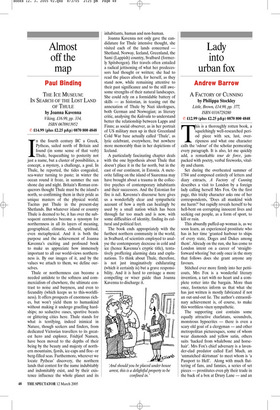Almost off the map
Paul Binding
THE ICE MUSEUM: IN SEARCH OF THE LOST LAND OF THULE by Joanna Kavenna Viking, £16.99, pp. 334, ISBN 0670913952 ✆ £14.99 (plus £2.25 p&p) 0870 800 4848 In the fourth century BC a Greek, Pytheas, sailed north of Britain and found (in some sense of that verb) Thule, bequeathing to posterity not just a name, but a cluster of possibilities, a concept, a mystery, a challenge, a goal. In Thule, he reported, the tides congealed, sea-water turning to paste; in winter the ocean round it froze, in summer the sun shone day and night. Britain’s Roman conquerors thought Thule must be the island’s north, so confirming them in their pride as unique masters of the physical world; Tacitus put Thule in the present-day Shetlands. But whatever island or country Thule is deemed to be, it has over the subsequent centuries become a synonym for northernness in all its layers of meaning, geographical, climatic, cultural, spiritual, even metaphysical. And it is both the purpose and the achievement of Joanna Kavenna’s exciting and profound book to make us appreciate how immensely important to all our world-views northernness is. By our images of it, and by the values we attach to them, we define ourselves.
Thule or northernness can become a needed antidote to the softness and commercialism of elsewhere, the ultimate contrast to noise and busyness, and even to fecundity (which keeps us to this-worldliness). It offers prospects of enormous riches, but won’t yield them to humankind without making it undergo gruelling hardships; no seductive oases, sportive beasts or glittering cities here. Thule stands for what is terrifying, indeed inimical in Nature, though seekers and finders, from dedicated Victorian travellers to its greatest hero and explorer, Fridtjof Nansen, have been moved to the depths of their being by the beauty and majesty of northern mountains, fjords, ice-caps and floeor berg-filled seas. Furthermore, wherever we locate Pytheas’ discovery, the northern lands that contest for the name indubitably and indomitably exist, and by their existence influence the whole planet and its inhabitants, human and non-human.
Joanna Kavenna not only gave the candidature for Thule intensive thought, she visited each of the lands concerned Shetland, Norway, Iceland, Greenland, the Sami (Lappish) country, Svalbard (formerly Spitsbergen). Her travels often entailed a radical jettisoning of what her predecessors had thought or written; she had to read the places afresh, for herself, as they stand now, while remaining attentive to their past significance and to the still awesome strengths of their natural landscapes. She could rely on a formidable battery of skills — as historian, in teasing out the annexation of Thule by Nazi ideologues, both German and Norwegian; as literary critic, analysing the Kalevala to understand better the relationship between Lapps and Finns; as social observer, as in her portrait of US military men up in their Greenland Cold War base actually called ‘Thule’, as lyric celebrant, everywhere, but nowhere more memorably than in her depictions of Iceland.
A particularly fascinating chapter deals with the one hypothesis about Thule that doesn’t place it in the far north, but in the east of our continent, in Estonia. A meteorite falling on the island of Saaremaa may have brought about a trauma in the collective psyches of contemporary inhabitants and their successors. And the Estonian for fire is tuli. Kavenna’s discourse here gives us a wonderfully clear and sympathetic account of how a myth can healingly be used by a small nation which has been through far too much and is now, with some difficulties of identity, finding its cultural and political feet.
The book ends appropriately with the furthest northern community in the world, in Svalbard, of scientists employed to analyse the contemporary decrease in cold and ice (hence Kavenna’s cryptic title), tentatively proffering alarming data and explanations. To think about Thule, therefore, is not just imaginatively exhilarating (which it certainly is) but a grave responsibility. And it is hard to envisage a more compelling or wiser guide than Joanna Kavenna to discharge it.
































































 Previous page
Previous page